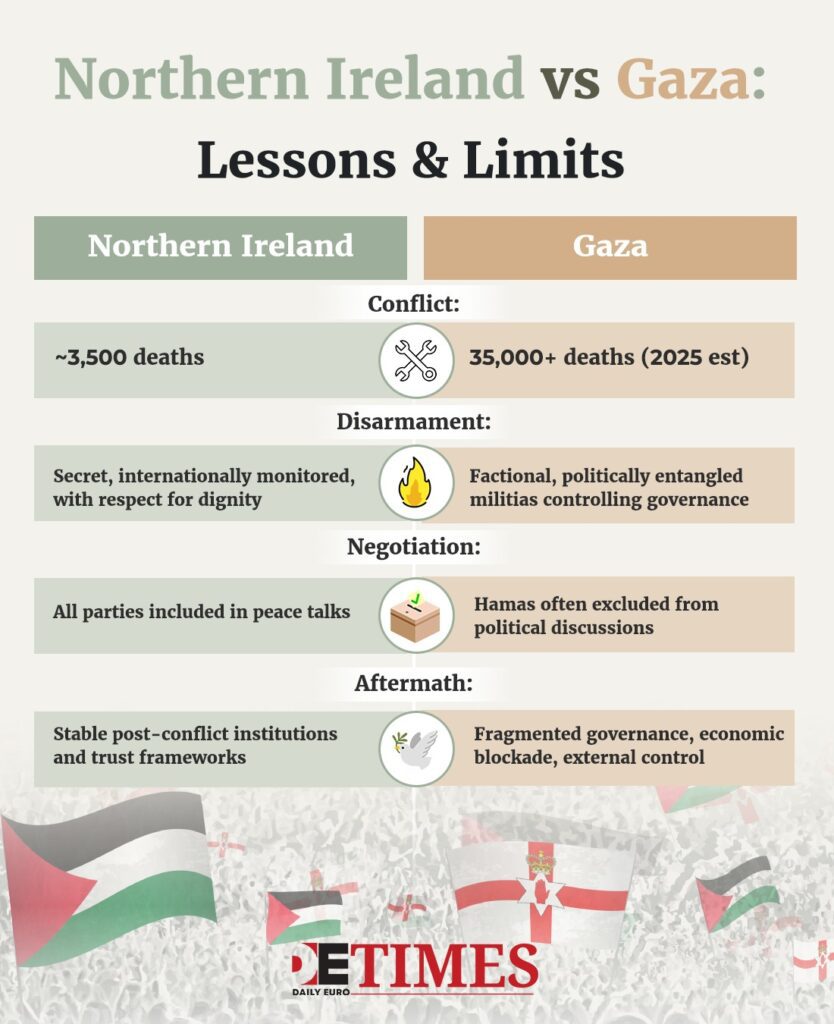In October, Keir Starmer stood before Parliament, offering Britain’s assistance in disarming armed groups in Gaza. He referenced Northern Ireland’s peace process experience, suggesting lessons from Belfast’s weapons decommissioning could ease tensions in Gaza.
The Prime Minister’s national security adviser, Jonathan Powell, who helped negotiate the 1998 Good Friday Agreement, played a quiet but praised role in recent Egypt ceasefire talks, earning respect from American mediators.
This approach focuses on technical skills developed through discreet, internationally monitored disarmament that allowed militants to maintain dignity while fulfilling peace commitments.
Powell seeks to apply these methods to Gaza’s situation, where sensitive handling of weapon disposal could play a major role.
Palestine Recognition and Its Symbolic Weight
In September 2025, the UK formally recognised Palestine as a state, after Starmer warned Israel must halt warfare and agree to ceasefires or face UK recognition. The timing evokes the legacy of the Balfour Declaration’s impact on the region 108 years earlier.
Palestinian ambassador Husam Zomlot described the recognition as carrying historical and moral weight, addressing long-standing grievances.
Observers from Chatham House judged it unlikely to change Israeli leadership’s stance, which dismissed it as irrelevant to Palestinian statehood.
The recognition appears driven mainly by internal UK political pressure, with half of Labour MPs signing letters demanding the act. Chatham House’s Bronwen Maddox noted Britain’s diplomatic role is limited in scope.
Gaza’s Conflict Compared to Northern Ireland’s Experience
Northern Ireland’s decades-long conflict resulted in thousands of deaths and injuries but was far less devastating in scale than Gaza’s suffering.
The IRA’s arms disposal, carried out secretly and under international monitoring, gave militants a way to save face while forging peace through political agreements and institutional confidence.
Gaza is governed by Hamas, which has controlled all public sectors since 2007, complicating disarmament efforts where armed factions hold governing authority.
Queen’s University lecturer Peter McLoughlin pointed out that Northern Ireland’s disarmament included all parties, armed groups included, in political talks: a factor often missing in Gaza, where Hamas is commonly excluded.
Ulster University lecturer Kristian Brown noted that the level of destruction endured in Northern Ireland did not approach Gaza’s catastrophic conditions.

Tony Blair’s Impact on Middle East Diplomacy
Tony Blair’s involvement in Middle East affairs carries mixed perceptions. After stepping down in 2007, he served as Quartet envoy promoting Palestinian economic projects and institution building while also engaging in private sector consulting, which complicated his neutrality.
While overseeing economic initiatives, settlement expansion remained unchecked and Palestinian statehood made little progress during his tenure. Blair’s association with the 2003 Iraq invasion colors views across the region.
Palestinian voices like teacher Umm Mohammed question why local Palestinian leadership is marginalized in favor of Blair’s prominence. Gaza resident Hussein Dhaher calls Blair widely rejected due to his connection to Iraq’s destruction.
When Trump appointed Blair to the Gaza Board of Peace, regional reactions were strongly negative. Trump acknowledged Blair’s low acceptance among some regional actors.
Technical Skill and Political Realities
Jonathan Powell offers valuable expertise in discreet disarmament and conflict management techniques, which earned widespread respect and could contribute to resolving Gaza’s crisis.
Blair’s political history, however, causes many to distrust British efforts, posing a barrier from the outset. While Britain’s recognition of Palestine addresses longstanding historic issues, it does not change reality on the ground.
The situation demands that technical knowledge be paired with credible political standing to have any chance of success. Memories of Iraq’s devastation and stalled Palestinian aspirations form a backdrop that complicates acceptance of British involvement.
Whether Gaza’s stakeholders will accept expertise associated with difficult legacies remains an unresolved challenge for Starmer.
Keep up with Daily Euro Times for more updates!
Read also:
Viceroy Blair: Why Europe Matters More Than Washington in Gaza
New Alliances, Old Tensions: Saudi Arabia, Pakistan, and the Future
It is Lonely in the Middle: Mass Immigration, Stagnation, and Taxes






